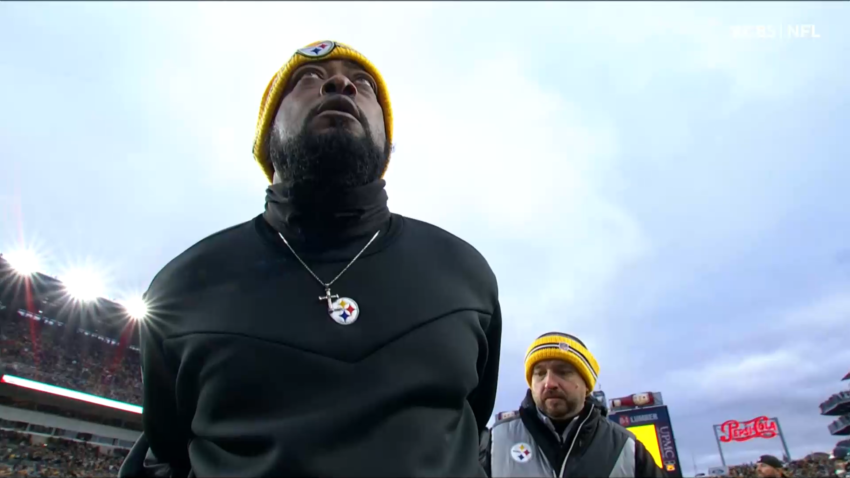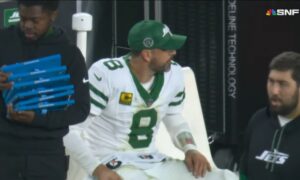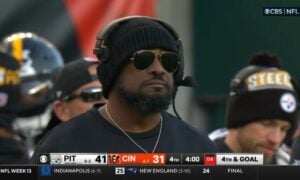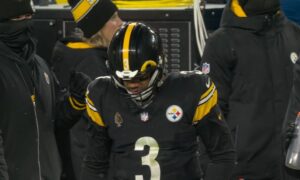For one quarter of Sunday night’s Wild Card game between the Pittsburgh Steelers and Kansas City Chiefs, offense was non-existent between the two teams. Over the eight drives in that opening quarter, seven of them ended in punts, one ended in an interception, and six of them lasted four or fewer plays.
That left the teams unable to separate from each other, and the score tied 0-0 after 15 minutes of play. And in the second quarter, one team got its offense going to create some separation, and it never looked back from there. After briefly trailing 7-0 to the Steelers, Kansas City scored 21 points in the second quarter to pull away, and then added another two touchdowns early in the third quarter to turn the playoff contest into a blowout, with Kansas City eventually winning 42-21 to advance to the Divisional Round of the postseason.
Pittsburgh’s offense eventually found some footing with a pair of second-half touchdowns. But it never kept up once Kansas City’s high-powered attack began to execute, creating a disparity between the franchises that helped decide the Wild Card game, as Pittsburgh head coach Mike Tomlin addressed in his postgame press conference, shared by the team.
“We didn’t execute nearly well enough. It was several minutes into the third quarter, we had two first downs. You’re just not going to keep pace with a lot of people like that, particularly an offense as explosive as the one Kansas City has,” Tomlin said.
Kansas City didn’t score until under six minutes left in the second quarter, on an eight-play drive finished by Jerick McKinnon’s four-yard touchdown pass from Patrick Mahomes, the first of five passing touchdowns in the game for the KC quarterback. But once Kansas City got started, it didn’t stop. It scored again with 1:55 remaining in the second, and then Mahomes engineered an 80-yard drive in only six plays and 39 seconds to add another touchdown 22 seconds before halftime.
On those three scores, Kansas City finally broke through a Pittsburgh defense that had played the Steelers not only to a tie early on, but a temporary lead. Cameron Heyward forced a fumble that T.J. Watt recovered and returned for a touchdown early in the second quarter, which had Pittsburgh in front for almost five minutes before the first of the Kansas City touchdowns.
Mahomes and his offense just eventually found a way to keep driving on the Steelers once that first touchdown had been scored to tie the game 7-7, as they have done with most of their opponents this season.
“You give them opportunities. We had to possess the ball, we had to minimize their possessions. We had to create scarcity for them in terms of opportunity, and we weren’t able to maintain that,” Tomlin said. “We were getting after them early on, but they still possessed the ball from a time of possession standpoint, they still had opportunities. We didn’t press them enough, we didn’t make them feel the pressure in totality of what we were doing.”
Pittsburgh was unable to sustain a drive in the opening half to dampen some of Kansas City’s momentum. All seven of Pittsburgh’s drives in the first half ended in punts, five of which were three-and-outs. The quick drives gave Kansas City additional opportunities to get its offensive gameplan working, and allowed things to finally click.
Pittsburgh, after a fumble on their first offensive play of the second half, did begin driving the ball after. Its next two drives went 10-plus plays each, and both ended in Ben Roethlisberger touchdown passes to Diontae Johnson and James Washington.
But by then it was too late with the lead Kansas City had put together, and one of the league’s best offenses helped drive the second seed through to a Divisional Round game against Buffalo, and end the Pittsburgh Steelers’ season.








